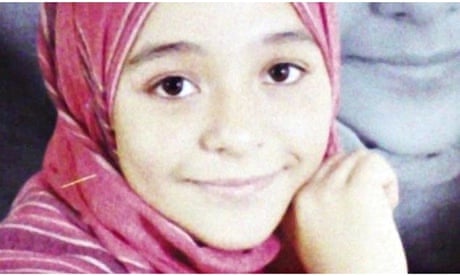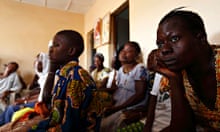A doctor will stand trial for the first time in Egypt on charges of female genital mutilation, after a 13-year-old girl died following an alleged operation in his clinic last year.
In a landmark case, Dr Raslan Fadl is the first doctor to be prosecuted for FGM in Egypt, where the practice was banned in 2008, but is still widely accepted and carried out by many doctors in private.
Sohair al-Bata'a died in Fadl's care in June 2013, and her family admitted that she had been victim to an FGM operation carried out at their request.
The case was initially dropped after an official medical report claimed that Sohair had been treated for genital warts, and that she died from an allergic reaction to penicillin. But after a campaign by local rights groups and the international organisation Equality Now, as well as an investigation by Egypt's state-run National Population Council (NPC), the country's chief prosecutor agreed to reopen the case – leading to this week's seminal prosecution of both Fadl and Sohair's father.
"It is a very important case," said Hala Youssef, head of the NPC, which had pushed for the case to be reopened. "It's the first time that somebody in Egypt will be prosecuted for this crime, and it should be a lesson for every clinician. The law is there, and it will be implemented."
According to Unicef, 91% of married Egyptian women aged between 15 and 49 have been subjected to FGM, 72% of them by doctors. Unicef research suggests that support for the practice is gradually falling: 63% of women in the same age bracket supported it in 2008, compared with 82% in 1995.
But according to research, FGM still has high support in areas with a lower standard of education, where proponents claim mutilation makes women less likely to commit adultery.
Families living near where Sohair died have not been put off the practice, says Reda Maarouf, a local lawyer involved in the case; they simply go to other doctors.
Sohair's family are reported to oppose her father's prosecution. "It's a cultural problem, not religious," said Vivian Foad, an official who led the NPC's investigation. "Both Muslims and Christians do it. They believe it protects a woman's chastity."
Some Islamic fundamentalists claim FGM is a religious duty, but it is not nearly as widespread in most other majority-Muslim countries in the Middle East. Suad Abu-Dayyeh, Equality Now's regional representative, said: "It's very much rooted in Egypt, but in other Arab countries – in Jordan, in Palestine, in Syria – we don't have it."
There are four main methods of committing FGM, according to the World Health Organisation, and Abu-Dayyeh said the practice of removing a girl's clitoris and labia was probably the most common in Egypt.
"It's a very painful procedure and I don't know why they do it. It's the worst one," said Abu-Dayyeh, who visited Sohair's grave in Mansoura, northern Egypt, as part of Equality Now's campaign. "Women will really not feel any pleasure when having sex with their husband. It's criminal."
Foad hopes Egypt's interim government will be more proactive about FGM than the administration it replaced after Mohamed Morsi's overthrow last year. Officially, Morsi's Muslim Brotherhood claimed they opposed FGM, but prominent members and allies of the group expressed support for it. "People are entitled to do what suits them," said Azza al-Garf, a female MP from the Brotherhood's political arm, in 2012. Another ultra-conservative MP, Nasser al-Shaker – a member of a Salafi party that was then an ally of the Brotherhood – called for legalisation of FGM, and said it had a religious mandate.
Two years on, Egypt's leadership has been criticised internationally for other human rights abuses, but Foad hopes it will be more progressive than its predecessors on FGM. "Under Morsi, they didn't create a conducive atmosphere through the media, and through education – not only for FGM but all women's issues. Now the government is responding positively, and the media is responding positively."
Abu-Dayyeh said Fadl's prosecution was just the start. The case would count for little unless the doctor was jailed and an anti-FGM awareness campaign reached the country's poorest districts, she said.
"Now you need much more work. And it has to be done far away from Cairo – in the [rural areas] where the practice is very widespread."
Additional reporting by Manu Abdo









Comments (…)
Sign in or create your Guardian account to join the discussion